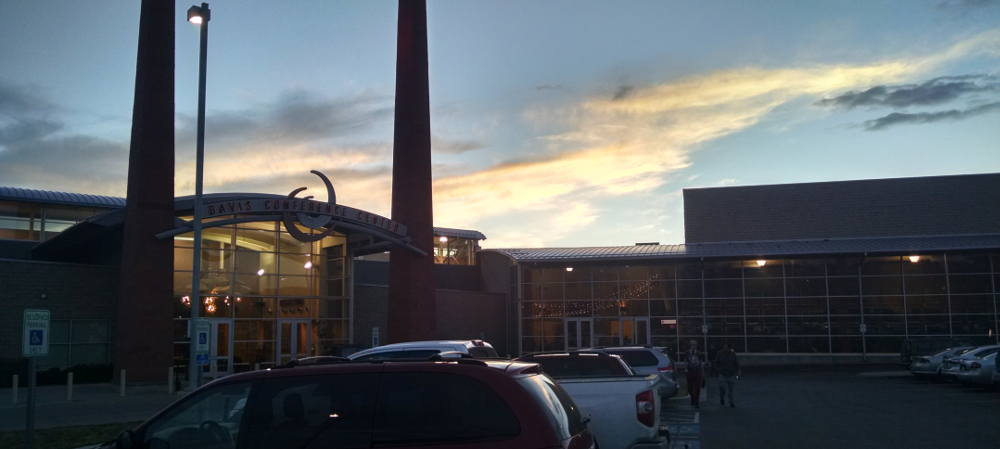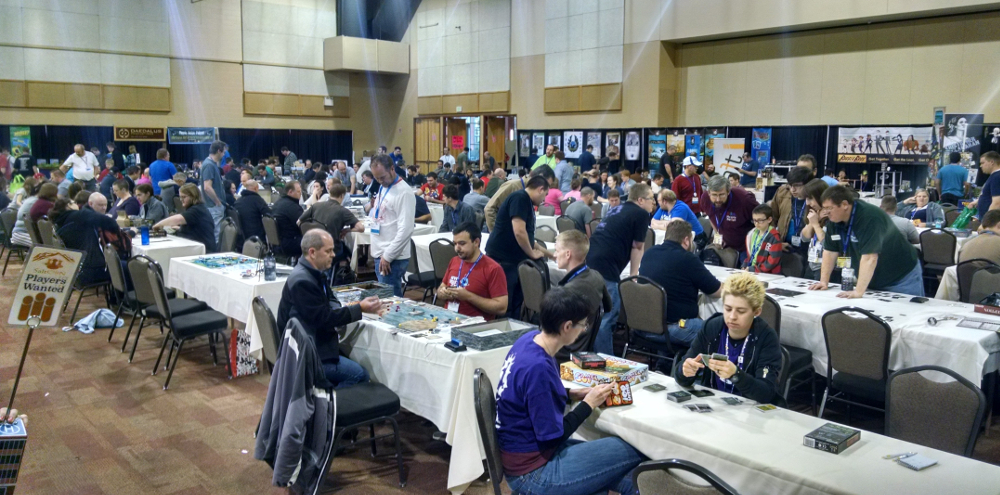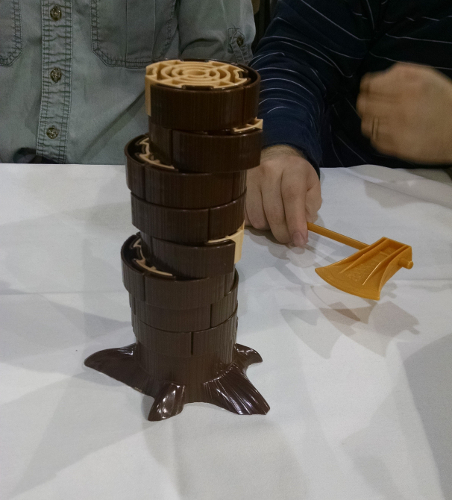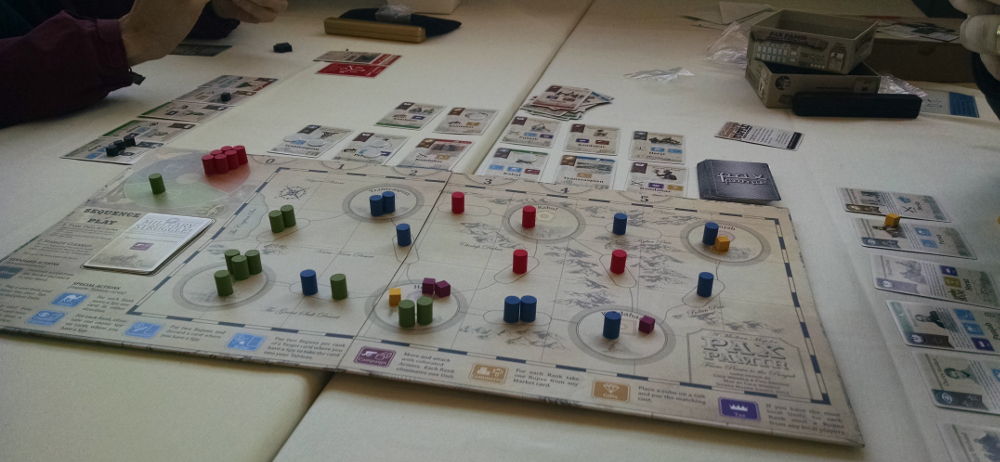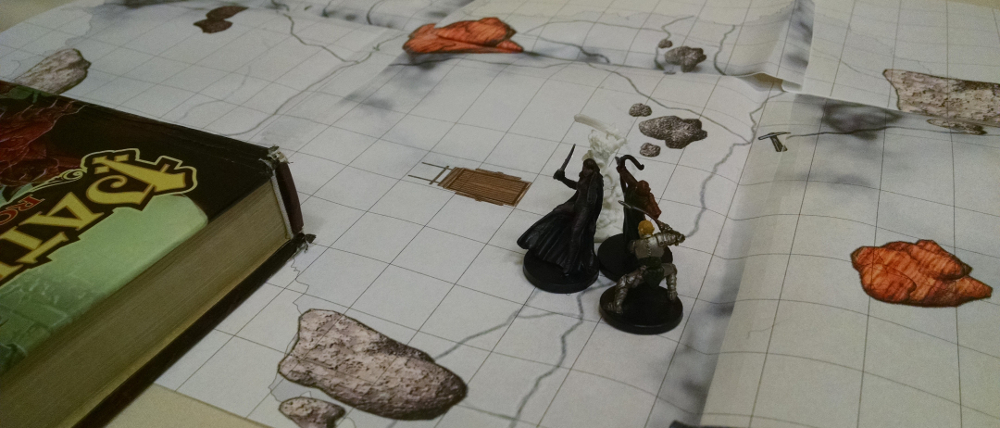For the third year in a row I went to SaltCon, the largest gaming convention in Utah. As the name implies, I drove up to Salt Lake City, the center of culture and business in Utah…and kept on driving. You see, despite the name SaltCon, the actual convention takes place in Layton, a city over 30 minutes away from downtown Salt Lake. The move is fairly recent, but it’s now a little misleading. That’d be like going to the San Diego Comic-Con if it were in Tijuana – although that sounds like a blast. Maybe next year.
After stopping to write down some ideas for ‘Comic-Con Queso 2019’, I arrived at the Davis Conference Center. Compared to national gaming conventions, SaltCon is small by comparison but is steadily growing every year. Over 1,100 attendees gathered for a weekend of board games, RPGs, prototypes, and promotions, all capped with the announcement of the con’s annual Ion Award game winners and a giant giveaway. That’s an increase of 39% from last year. That’s an impressive rate, but it’s also not surprising considering the growth of board games around the world – and in Utah particularly. But even having to drive an hour and a half to get there, I instantly felt better once I saw the giant glass facade and saw how packed the place was.
In previous years, most of my time was spent demoing games for publishers and scouring the game swap table for hot deals. This SaltCon was different though. This time, I was going with friends. Plural. But going to a convention with other people required a rewiring of my past SaltCon experiences. This wasn’t going to be easy. I was jumping into the deep end.
With conventions, there are hundreds of things to grab your attention. You could spend all of your time walking around the exhibitor hall, looking at all of the booths and talking with industry professionals.
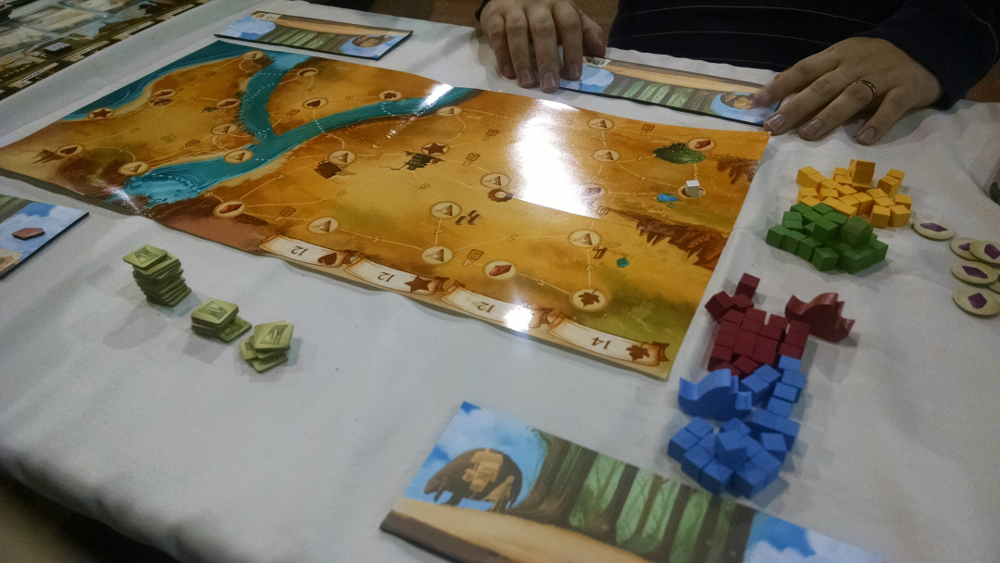 One highlight this year was getting to sit down with Ryan Laukat of Red Raven Games and play his latest prototype, Ruin. We were able to learn the game straight from the designer himself and give direct feedback during our play. Smaller conventions like SaltCon remove the gap between player and publisher and create a cosy environment for meaningful interactions. SaltCon had no shortage of small publishers, with many folks appearing at a convention for the first time.
One highlight this year was getting to sit down with Ryan Laukat of Red Raven Games and play his latest prototype, Ruin. We were able to learn the game straight from the designer himself and give direct feedback during our play. Smaller conventions like SaltCon remove the gap between player and publisher and create a cosy environment for meaningful interactions. SaltCon had no shortage of small publishers, with many folks appearing at a convention for the first time.
Such conventions are more subdued than their larger expo-style con cousins, and there were few flashy demonstrations on display save for Patrick Nickell from Crash of Games and his pod of sleek Geek Chic gaming tables. Instead, designers stood behind their games like owners at the Westminster Dog Show. They are proud of their creation and are happy to share their vision with anyone who stops by, which is always nice to see.
But this year I wasn’t focusing on publishers; I was fostering relationships. Sometimes I forget about the social aspect of board games. It’s not all about moving pieces on a map but making an effort in being socially productive. Meeting new people and strengthening friendships is a lot harder than trading in the Mediterranean, but it sure is more valuable. I am extremely grateful for those who commit to being friendly and inclusive in an increasingly unfriendly world. Interaction with complete strangers is something I still struggle with. For instance, I recently found a group of people from Salt Lake who had regular game nights and I was lucky to attend a few. The distance from my home keeps me from participating every week, but the host keeps reaching out to me to make sure I know I am still welcome. And it’s appreciated.
That’s the kind of thing these regional conventions offer.
At SaltCon, most of the action happens in the main ballroom with the exhibitors booths. On both sides of the room are rows of open gaming tables for players to grab for their group. We never had an issue finding a table, but the noise level made it difficult to hear each other across the table. Luckily, you could go into the lobby for some quieter gaming and to feel sunlight on your face through sizable windows, which was a nice break from the artificially-lit halls. Since I have basement accommodations, I’m a bit sunlight-starved. Sometimes I just need some Vitamin D with my serving of cardboard.
SaltCon also makes it easy to step away from the action if you desire. Games are a wonderful way to spend time with friends, but taking advantage of nearby restaurants allow for meals that don’t have to take place in the convention center. BGG.Con wishes it was this close to other food options…
I decided for this SaltCon I was going to be more adventurous in my gaming time. Archetypes aside, I’ve been trying to figure out what my preferred gaming style is for a while now. Do I like Ameritrash games more, or do Euro games float my boat? Head-to-head battles or multiplayer solitaire? My weekend at SaltCon made me more open to all sorts of gaming, as cons are wont to do.
For example, on Saturday I played Pax Pamir, a game that wasn’t anywhere on my radar. A game that takes place in the tumultuous region of Afghanistan? In the 19th century? And there aren’t even dragons? I don’t own or even play many games based on real locations or historical events. Unless King of Tokyo counts.
Yet Pax Pamir turned out to be one of the best games I have ever played. It was complex, but once it got going I was very much invested in the outcome. It grabbed me in a way that few games have, for not only was it fun, it was intellectually challenging. Most games I play have short-term memory, in that decisions I made only a few turns ago don’t have a giant effect in the present and current decisions won’t last a few turns from now. Pax Pamir makes every turn build upon past efforts until it culminates in a final showdown at the end of the game. It was a whole other world than I had experienced before. I still love lighter fares, but Pax Pamir taught me that mental struggles can enhance the fun in a game, not chase it away.
SaltCon lasts for four days, though I only had half of Friday and all of Saturday to participate. That said, I didn’t feel like I was missing out. I could have stayed longer for giveaway and the likes, but because I was so close to home, I figured it’d also be a good idea to spend more time with my wife. Like many other conventions of its size, admission to SaltCon is cheap enough that you don’t feel cheated if you don’t stay as long as possible.
I could write about every specific experience I had at SaltCon, but I do want to say that local conventions are a fantastic alternative to large ones. They are more laid-back affairs that can lead to friendships and interactions long after the convention ends. If you don’t want to be lost in the crowds of giant shows like Gen Con or Origins Game Fair, take a closer look at local conventions near you. You don’t need to spend a lot of time searching for the perfect convention if you jump into the deep end of smaller, more manageable settings. You’d be surprised how well you swim.

